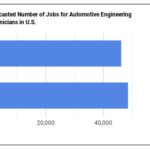Automotive Porter: Role, Responsibilities, and Career Guidance

Introduction: Understanding the Automotive Porter Role
An automotive porter is a crucial entry-level professional in dealership operations, responsible for moving, parking, cleaning, and maintaining vehicles to ensure a seamless customer experience and efficient business operations. While often behind the scenes, the porter’s work directly impacts the dealership’s productivity, appearance, and reputation. This article explores what an automotive porter does, the qualifications required, and how to pursue a career in this vital position.
The Core Responsibilities of an Automotive Porter
Automotive porters perform a variety of tasks to keep dealership lots organized and vehicles in optimal condition. Their primary duties include:
- Moving and parking vehicles : Porters relocate cars between the showroom, service area, storage, and customer pickup points. This ensures inventory is positioned for display, maintenance, and delivery [1] .
- Maintaining lot organization : They keep track of vehicle locations and inventory, often taking detailed notes and tracking VIN numbers to prevent confusion or loss [3] .
- Cleaning and minor maintenance : Porters clean vehicle interiors and exteriors, perform basic maintenance tasks such as changing batteries, refilling fluids, or starting vehicles daily to maintain readiness [5] .
- Customer interaction : They may provide shuttle services, assist customers with questions, and support vehicle deliveries to customer homes or other locations [4] .
- Supporting dealership staff : Porters help mechanics with simple tasks and assist management with offsite errands, documentation, and lot upkeep [2] .
Through these responsibilities, porters help dealerships present their inventory professionally and operate efficiently, directly contributing to sales and customer satisfaction.
Examples of Automotive Porter Duties in Practice
Consider the following real-world scenarios illustrating the impact of automotive porters:
- Morning Lot Preparation: At the start of each day, the porter inspects and starts all vehicles on the lot to ensure they are ready for test drives and spot-checks for mechanical issues. This proactive approach helps prevent delays and surprises during customer visits [5] .
- Customer Shuttle Service: When a customer schedules vehicle servicing, the porter transports them to and from their home or workplace, providing an added convenience that enhances the dealership’s reputation [4] .
- Inventory Management: After a busy weekend, the porter reorganizes the lot, updates inventory records, and ensures each vehicle is clean and ready for the next round of customers [1] .
These examples highlight the diverse and dynamic nature of the porter’s role and its importance in dealership operations.
How to Become an Automotive Porter: Step-by-Step Guidance
For those interested in pursuing this career, here are practical steps to get started as an automotive porter:
- Meet basic requirements: Most dealerships require porters to have a high school diploma or GED, a valid driver’s license, and a clean driving record. Some may require applicants to be over 18 years old [4] .
- Develop relevant skills: Experience driving various vehicles (including manual transmission), basic auto maintenance knowledge, and strong communication skills are valued. Customer service experience is a plus [3] .
- Search for job opportunities: To find porter positions, visit dealership websites, automotive job boards (such as AutoJobs.com), or major employment platforms. Search for terms like “car porter,” “service porter,” or “lot attendant.”
- Prepare a resume highlighting relevant experience: Emphasize your driving history, mechanical aptitude, and any customer service background.
- Apply and interview: Be prepared to demonstrate safe driving skills and discuss how you handle responsibility and teamwork. Many dealerships conduct background and driving record checks as part of the hiring process.
If you wish to advance, consider gaining experience in auto mechanics, sales, or service advising, as porter positions often serve as a stepping stone to higher roles within the dealership [3] .
Challenges Faced by Automotive Porters and Solutions
Automotive porters encounter several everyday challenges, including:
- Weather conditions: Porters work outdoors in all climates, which requires preparation and adaptability. Wearing appropriate gear and taking breaks as needed can help manage extreme weather [2] .
- Physical demands: The job requires lifting, walking, and moving vehicles for extended periods. Maintaining physical fitness and using safe lifting techniques are essential.
- Managing multiple tasks: Porters often juggle cleaning, moving, and customer service simultaneously. Effective time management and teamwork can help balance these demands [4] .
- Responsibility for valuable assets: Handling inventory worth thousands of dollars requires attention to detail and trustworthiness. Building a reputation for reliability can open doors to advancement.
Dealerships may support porters by providing training, clear protocols, and safety equipment to mitigate these challenges.
Alternative Pathways and Career Advancement
While the porter role is entry-level, it can lead to other opportunities in the automotive industry. Many porters pursue:
- Service advisor positions : By learning more about vehicle service and customer needs, porters may advance into service advising roles.
- Auto mechanic apprenticeships : Experience supporting technicians prepares porters for technical training.
- Sales roles : Customer interaction experience can be leveraged in vehicle sales or leasing positions.
To explore these pathways, porters should ask about internal training programs, network with colleagues, and express interest in learning new skills. Dealerships often value motivated employees who demonstrate reliability and a willingness to learn [3] .
Accessing Automotive Porter Job Opportunities
To find and apply for automotive porter positions:

Source: medium.com
- Visit official dealership websites and look for their careers or jobs section.
- Use reputable automotive job boards such as AutoJobs.com ( verified link ).
- Search general employment platforms like Indeed ( verified link ).
- Contact local dealerships directly to inquire about openings and application procedures.
When applying, use search terms such as “car porter,” “service porter,” “lot attendant,” and “automotive porter.” Be sure to follow the instructions provided on each official website, and never submit personal information to unverified sources.

Source: portersindustrial.com
Key Takeaways
An automotive porter plays a vital role in dealership operations, ensuring vehicles are moved, cleaned, and maintained to the highest standards. The position offers hands-on experience, customer interaction, and opportunities for career advancement within the automotive industry. For those interested in entry-level automotive careers, following the steps outlined above can lead to rewarding job opportunities and long-term growth.






